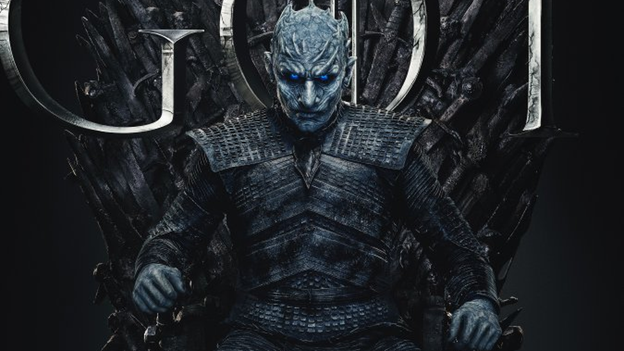There’s a great deal at stake when
the final season of “Game of Thrones” begins this Sunday, and I don’t
mean the question of who will end up sitting on Westeros’s Iron Throne.
Rather, HBO’s fantasy epic is staring down the quandary that faces all
true water-cooler shows, and has been especially pressing in this
so-called Golden Age of television. Can showrunners David Benioff and
D.B. Weiss wrap up the story in a way that is satisfying to fans — some
of whom have been longing for this conclusion since 1996 when George
R.R. Martin published “A Game of Thrones” — and more importantly, in a way that is true to the show’s finest qualities?
Trying
to accomplish both of these sometimes-contradictory goals is a
tremendously difficult task, even for the most accomplished television
shows. “Sex and the City” and “Breaking Bad” both whiffed, the former by going full fairy-tale,
the latter by allowing its meth-cooking high school teacher to reinvent
himself as an action hero even after acknowledging that he was a
monster. “The Shield”
succeeded by delivering an incomplete reckoning to crooked cop Vic
Mackey (Michael Chiklis) that highlighted both the value of his
pursuers’ persistence and the difficulty of achieving accountability.
And “The Sopranos” achieved immortality and launched a thousand speculations with its now-infamous cut to black.
Despite the years I’ve spent reading, watching and writing about “Game of Thrones,” I don’t know where the series is going to finish. But if the series is to conclude with integrity, I know exactly how it should end: with no one sitting on the Iron Throne.
There
are many ways to judge “Game of Thrones” — from the technical and
logistical accomplishments that produced its stunning battle sequences
and moments of magic; to the casting alchemy that brought together
first-time actresses Sophie Turner and Maisie Williams as sisters Sansa and Arya Stark; to the brilliantly convoluted plotting that Martin bequeathed to Benioff and Weiss.
But the reason “Game of Thrones” was worth
all of the breathless discussion and Internet sleuthing was revealed
slowly over the first season. The dissolution of King Robert Baratheon (Mark Addy)
serves as a blunt reminder that being able to bash people’s chests in
with a war hammer is no guarantee that you’ll be able to run your
government, love your wife or find a new way forward into dignified
middle age. The stunningly casual cruelty of the king’s brother-in-law,
Jaime Lannister (Nikolaj Coster-Waldau) and the brooding menace of Gregor Clegane (Hafþór Júlíus Björnsson) argue that knight’s armor is decoration, not proof of good character. And the iconic moment that Ned Stark (Sean Bean),
our well-meaning ostensible hero loses his head, wasn’t merely a
stunning twist. It was the instant “Game of Thrones” really got started
on its brutal deconstruction — emphasis on brutal — of our Disney-fied
conception of fairy tales in general and the ideals of chivalry in
particular.
That commitment to
turning an entire genre ruthlessly topsy-turvy is the reason viewers and
critics could talk about “Game of Thrones” as more than, as the actor
Ian McShane memorably put it,
“tits and dragons.” Yes, the series featured an awful lot of naked
women, but it also had smart insights about how a person’s — and a
society’s — gaze can turn from admiring to rancid. The show depicted
rape frequently, but it took both an individual and systemic approach to the subject, exploring how tolerating sexual violence can upend whole societies.
I
understand why it’s tempting to place your bets for who will occupy the
Iron Throne. But if you’re rooting for a version of “Game of Thrones”
that lives up to the show’s sometimes-uneven exploration of big ideas
and arguments about the institutions and traditions that shape people,
the only possible happy ending is one that ends with that infernal chair
either abandoned or melted into slag.
If “Game of Thrones” ends with Jon Snow (Kit Harington)
ruling Westeros, the series might as well go back in time and reattach
Ned Stark’s head for all it will have done to undo its efforts to
unsettle our expectations for how this sort of story goes. If Daenerys
Targaryen (Emilia Clarke), Sansa Stark (Turner) or Cersei Lannister (Lena Headey)
takes the throne, the show will be one step above that, a dark feminist
retelling of a canonical story, perhaps with an antiheroine rather than
a true heroine, but it would still be something we’ve seen before.
Rather,
for “Game of Thrones” to be true to its argument, its protagonists must
be destroyed by the systems they’ve attempted to transcend or give way
to something entirely new. If Daenerys follows in the tradition of her
ancestors and goes mad; Jon has to kill her; or if the messy mass of
humanity can’t stand against the implacable, snowy discipline of the
White Walkers, the repudiation of the dream that one good person can
save us that “Game of Thrones” began in its first season will be
complete.
But there is one
alternative. The long-announced title for Martin’s final novel in the
series is “A Dream of Spring.” The book was originally supposed to be
called “A Time for Wolves,” which would seem to herald a renaissance of
House Stark and its direwolves. But when Martin announced the switch in 2006,
he said “it gives a better sense of the book that I want to write.” A
happy ending for Martin’s characters, and for the occupants of the world
torn by warring kings where we’ve spent so long, might be to walk away
from the Iron Throne entirely and allow a new kind of government to push
forth hopeful shoots in its place.

No comments:
Post a Comment